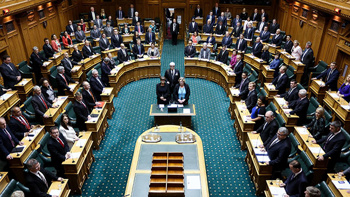Finance Minister Grant Robertson is defending his cost-of-living Budget package from criticism it is too short-term and narrow, saying long-term or widespread relief would only stoke inflation further.
Robertson delivered his fifth Budget yesterday – the first since 2020 in which Covid-19 was not the dominant feature but which addressed one of the hangovers of Covid-19 – rising inflation.
It included a whopping $11 billion for the health system as the Government beds in its reforms, pays off DHB deficits and absorbs the cost increases in the sector. It also included a total of $61.9 billion earmarked for infrastructure spending over the next five years.
But the Budget surprise was a $1 billion cost-of-living package, including a new temporary payment totalling $350 for about two million workers who earned less than $70,000 and who did not already get the Winter Warmer Payment.
That payment was being passed into law under Urgency last night and the $814m for it will come out of the now disestablished Covid-19 Fund. However, it will only be paid out for three months.
The $27 extra a week that young people and others will get from the Budget is "not even one Uber Eats order", says one 20-year-old.
And the dream to enter the property market has been put on hold for one 24-year-old woman after her weekly supermarket bill has increased by $30. "And $50 of petrol doesn't even fill half a tank!"
Robertson said today that inflation was projected to start to come down in the second half of this year, but warned the country would not return to low levels for "some time".
He told Newstalk ZB's Mike Hosking the extended help with petrol and transport costs was a recognition that high prices would be apart of our fiscal landscape for the time being.
"It's recognition that the costs are still there but what we're doing is targeting that support as we go forward from here," said Robertson.
He described the measures as striking a balance of supporting people in the here and now but getting the fiscal situation in hand.
"The forecasts we've got is that inflation will start to come down in the second half of this year and we'll start to target our support a bit more in that period," said Robertson.
The Budget provided a targeted response to Kiwis with the cost of living payments to those earning under $70,000 and free public transport to those with Community Service Cards.
"It is a progression to a more targeted response albeit inflation will still be there but the forecast we have is that it starts to come off in the middle of the year," he said.
Robertson said Treasury's advice was that inflation had peaked at 6.9 per cent.
He said it was an "annualised" number but did not regard it as delusional.
"Inflation can stay higher than its normal levels by coming off the peak and that is based on the fact that the New Zealand economy starts to open up more, we've got people coming back in terms of both tourists and those coming to migrate here and that is still their forecast for the second half of this year."
He said it didn't mean the country returned to the 1-3 per cent inflation band and that wouldn't happen for some time.
As The Spinoff wryly reported, the $27 wouldn't be enough to make the 18 cheese rolls that Robertson and Jacinda Ardern showed off in their pre-Budget social media chat yesterday.
Ingredients for a Maggi recipe to make 20 cheese rolls cost $28.70.
"That a snack made famous by its simplicity and, in the past, cheapness now costs the same as a lovely takeaway dinner, says something both about the cost of food and the inconsequence of $27 in today's economy," wrote The Spinoff's Madeleine Chapman.
The Budget also extended the 25-cent a litre fuel tax and road user charges cut and half-price public transport for a further two months until the end of August.
Robertson has not ruled out extending support beyond those three months, saying the Government would monitor the situation. However, he said inflation was forecast to ease after peaking in the middle of the year, and the support was to help those on lower to middle incomes ride out that peak – not for the long term.
The Budget's offerings were slated by National leader Christopher Luxon and finance spokesman Nicola Willis as spending too much on the wrong things and not enough on the "squeezed middle".
Willis said the temporary payments were a bandaid measure – and suggested the $350 could end up being used by people to buy a one-way ticket to Australia instead for better conditions.
Willis took aim at Robertson's claim high inflation was a temporary issue, pointing out that Treasury forecasts still had inflation at more than 5 per cent next year – and not dropping back to about two per cent until 2026.
She said mortgage rates were up, food prices were up, petrol prices were up and they would not be going down anytime soon.
"Don't think it's getting any better under Labour."
Prime Minister Jacinda Ardern also defended the Budget, saying it was aimed at giving people as much certainty as possible in an uncertain time.
"[We are] dealing with the immediacy of the economic and health challenges Kiwis are facing, while also looking to the challenges of tomorrow, and seeking to buffer our people from both."
Robertson said the Budget was aimed at addressing long-term issues such as infrastructure, climate change and the health sector, and cutting spending would not reduce the prices Kiwis were facing at the pump or in the supermarket. "It will only undermine the wellbeing and security of our people. That is not an option I am prepared to consider."
The biggest ticket spend was in the health sector, which got its own cost-of-living adjustment: more than $11 billion – the largest in history.
Most of that would be soaked up covering rising costs in the health sector and to clear DHB deficits to allow the new Health NZ agency to start off on a level footing.
There were some well-received elements in the Budget – including changes to the caps for first-home buyers to qualify for grants and loans, and more funding for ambulance and helicopter services.
There was also a boost for Pharmac, which Health Minister Andrew Little said he expected would be used primarily for better cancer treatments.
Te Pāti Māori co-leader Debbie Ngarewa-Packer said the Budget fell short in delivering to those at who needed help the most.
"Whilst two months further relief at the pump is welcomed, this is no solution to curbing the rising costs to live in Aotearoa."
Her fellow co-leader Rawiri Waititi said the offering for Māori, especially in the health budget, were pitiful given the Government's promises.
The Green Party also said more should have been done for those on lower incomes, given the new payment excluded beneficiaries.
Act Party leader David Seymour said the Budget had failed to deliver with inflation and rising prices.
"Jacinda Ardern and the Labour Government have today presented New Zealand with the brain-drain Budget. Ambitious New Zealanders, tired of being milked, will weigh up leaving for greener pastures."
Take your Radio, Podcasts and Music with you










